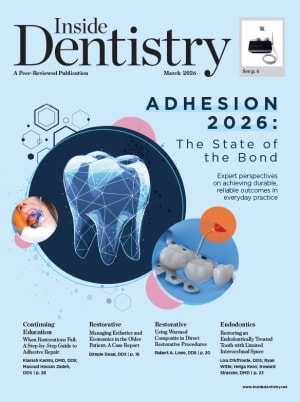Dental Care for Patients With IDD
Michele Penrose
According to the United Nations' Factsheet on Persons with Disabilities, people with disabilities represent approximately 15% of the world's population, making them the world's largest minority group. The National Disability Navigator Resource Collaborative's Population Specific Fact Sheet - Intellectual Disability notes that more than 7.5 million people in the United States with an intellectual and developmental disability (IDD) such as Down syndrome, Fragile X syndrome, autism spectrum disorder, and fetal alcohol syndrome. Although the American Dental Association (ADA) guarantees equal access to oral healthcare, that access is disproportionately reduced for people with IDD, making it one of the more significant problems that they face. Oral healthcare is an important component of maintaining one's overall health and well-being, so increasing awareness of this issue and inviting patients with IDD into your practice is absolutely critical.
At the core of the problem is a lack of properly trained dental healthcare providers, which has subsequently resulted in a shortage of providers who are willing and able to provide that care. Medicaid reimbursement is another significant barrier to care. Treating patients with IDD is not as challenging as many providers fear, and the ADA's Principles of Ethics and Code of Professional Conduct states that "dentists shall not refuse to accept patients into their practice or deny service to patients because of the patient's…disability."
"People with disabilities have no issues with access to care from physicians," says Steve Perlman, DDS, MScD, DHL, clinical professor of pediatric dentistry at Boston University's Henry M. Goldman School of Dental Medicine, global clinical director and founder of the Special Olympics Special Smiles initiative, and cofounder and past president of the American Academy of Developmental Medicine & Dentistry (AADMD) (aadmd.org). "In the field of medicine, treating this population is part of practitioners' education, background, training, and DNA. Historically, however, dentists have not shared this attitude."
Although some patients with IDD will still exhibit behavioral issues, the majority of them could and should be mainstreamed into a general practice with little or no special considerations. There is no easy solution to the twofold challenge of how to train current dentists to treat patients with IDD and how to invite these patients into their practices. The Smiles for Life Foundation (smilesforlife.org) is generously supporting the distribution of 8,000 mouth guards to patients in need through the Special Olympics Special Smiles program. The foundation and the Crown Council also plan to collaborate with the Special Olympics Special Smiles program on an adopt-an-athlete program whereby Crown Council dentists invite patients with IDD into their offices in order for them to experience that treating these patients can be just like treating any other patient. Individual dentists should seek out training and add messaging to their websites about welcoming patients with IDD. Various educational resources are available online, including from the AADMD and the dentistry programs of several universities.
The first step, of course, is increasing awareness of the issue. "Access to and the ability to receive oral health services is the No. 1 healthcare problem that children and adults with IDD face," Perlman says. A lack of preventive information and regular care can lead to higher medical costs, an increased burden of disease, more significant oral health problems, and medical comorbidities that are related to and caused by poor oral health. However, because they are faced with other issues, individuals with IDD and their caregivers often fail to prioritize oral care, which is likely, in part, because of the barriers that are in place. And even when they do receive care, oftentimes, they are able to do so only after their families have driven them several hours to dental practices that will see them. Wait times can be as long as a year at practices and dental school programs that perform sedation and general anesthesia on patients with IDD.
According to a 2016 study published in the American Journal of Public Health by Hosking and colleagues, 37% of the deaths of people with intellectual disabilities were classified as being amenable to healthcare intervention when compared with 22.5% among the general population. By spreading awareness and making conscious efforts to invite these patients into dental practices, we can make an impactful difference. Doing so is not a choice, but a moral and ethical obligation.
About the Author
Michele Penrose is the director of development for the Smiles for Life Foundation.
